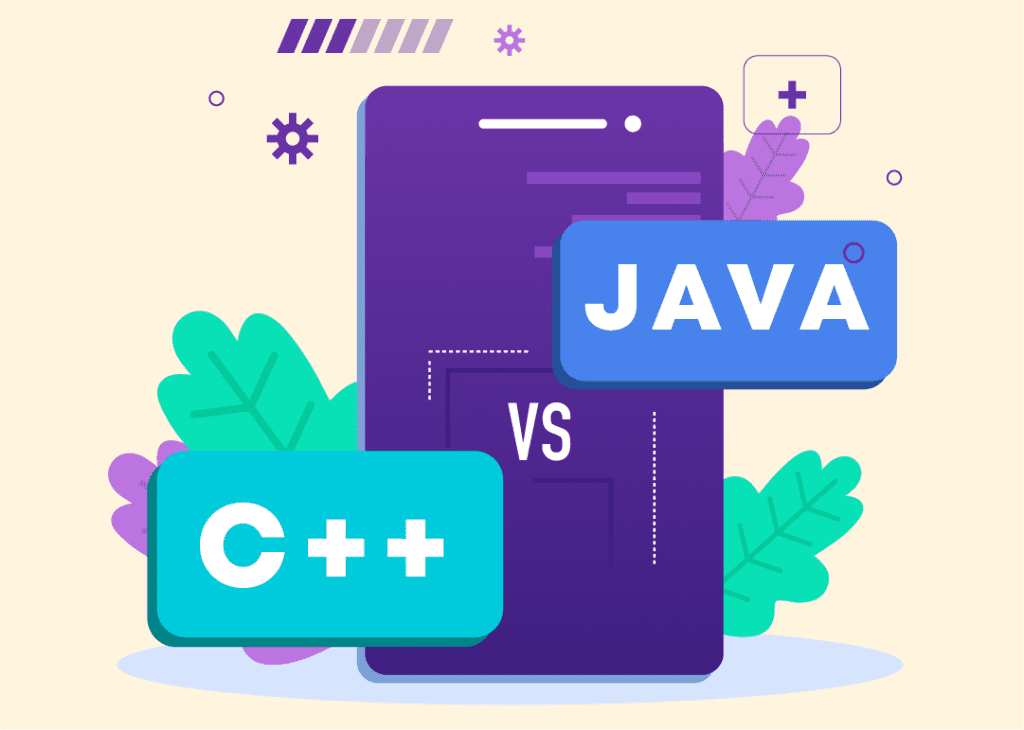To start with, we should find out a little with regards to these advances, and afterward, we will get into C++ and Java contrasts.
Table of Contents
ToggleWhat is C++?
The C++ programming language gotten from C, and contains the properties and highlights of C. C++ principally made for the advancement of frameworks and applications. Therefore, It was C++ language that first acquired quite a while like classes and items. Fit for exemplifying both low-level and undeniable level highlights of C, while considered as a middle level language also.
What is Java?
Java fabricated utilizing a virtual machine, which permits designers to keep up with the security of the code and make it profoundly versatile. Java coordinated with an exhaustive library that offers support for deliberation. This language explicitly made to program applications. In addition, Java’s deciphering usefulness helps with printing frameworks, which has prompted the advancement of organization figuring.
Presently, you will find out about C++ and Java contrasts based on which you can pick the language that suits your prerequisites. You can Hire Java Developer if you are looking for App Development.
Java vs C++
In the wake of getting momentarily familiar with Java and C++, we should investigate the distinctions between them.
- Codes in C++ assembled into each platform you use it on. Notwithstanding, Java versatile, permitting it to be executed on all platforms.
- C++ source code is ordered as an article code that delivers a result when executed, while Java source code is a byte code, which makes it platform independent.
- In C++, designers need to distribute and deallocate memory to the code physically with administrators like new and erase, yet that isn’t true with Java as the framework allots the memory for the code all alone.
- Not at all like C++, Java doesn’t uphold different legacy. Notwithstanding, Java can utilize points of interaction to acquire a similar outcome as in various legacy.
- C++ an item situated and procedural programming language, which is the reason it doesn’t follow explicit root pecking orders, while Java is totally an article arranged language with one root progressive system.
The distinctions recorded above are a portion of the huge ones between the two dialects, in light of which engineers for the most part pick their decision. Be that as it may, these aren’t all. We should investigate a portion of different contrasts between the dialects.
Different Comparisons Between Java vs C++
- There is no root order in C++ as it is a half breed language that upholds procedural and object-situated programming. In any case, Java, can agree to be a totally object-arranged programming approach.
- In C++, there is no specific connection between record names and class names. This permits C++ to have a few classes with any record name, and the document name doesn’t have to match the class names. Be that as it may, in Java, a cozy connection between the two is authorized, so the name of the class with the source code ought to be equivalent to the record name.
- C++ is a superior choice for framework level programming since it offers direct calls to libraries, while Java doesn’t permit it. In Java, nonetheless, engineers can call the libraries utilizing Java Native Access or Java Native Interface.
- Highlights in view of article situated language and procedural language recognize C++ from different dialects. Then again, Java’s programmed trash assortment is its distinctive element.
-
What are the upsides of Java over C++?
A portion of the upsides of Java programming language over C++ are as per the following:
- Java has a programmed memory the board highlight called trash assortment, while this part isn’t accessible in C++.
- Programs in C++ are mind boggling and slow contrasted with Java.
- Java utilizes the twofold configuration, but that isn’t true with C++.
- Java upholds dynamic connecting, however C++ doesn’t.
- Dissimilar to C++, Java is convenient.
-
Which is better, Java vs C++?
With regards to picking between the two dialects, Java and C++, everything reduces to the highlights you really want for your task and code. Both these dialects have their own arrangements of benefits and faults, and in light of this, you can settle on your decision.
Subsequently, C++ is the most ideal decision for framework programming, while this is impossible utilizing Java. Java, all things being equal, is an incredible choice when utilized in applications like work area, web, and the sky is the limit from there.
With C++, engineers have the adaptability to do anything from framework and undertaking programming to gaming. There are a couple of low-level projects for gaming and different applications that designers can’t make utilizing the Java language.
Thus, the decision of a programming language relies exclusively upon the application that should be fabricated. To settle on the decision, you can make a rundown of the advantages and disadvantages of the two dialects. Therefore, at that point, you can check which elements are best for your program and select the language appropriately.
-
Is C++ all the more impressive contrasted with Java?
Java is simpler to learn and use as far as language and punctuation. Notwithstanding, with regards to low-even out applications, including framework programming, C++ tops the rundown.
Java can be viewed as more impressive because of its programmed trash assortment highlight and the shortfall of various legacy and pointers, however C++ is strong as far as speed. Additionally, in gaming and different applications where the state should be recorded, the trash assortment component can exacerbate the situation, worse.
In this way, based on what application you really want to assemble and the highlights that you are searching for, the more remarkable language not entirely set in stone.
-
Is it conceivable to learn Java without knowing about C/C++?
Indeed. It is feasible to learn Java with next to no earlier information and involvement with C/C++. You can begin learning Java once you have a comprehension of the programming basics and the idea of item arranged programming.
-
Are Java and C++ the same?
Java and C++ have a couple of likenesses and a bunch of contrasts. Particularly, You can say that they are comparable here and there yet disparate in others.
Therefore, Both Java and C++ are object-situated programming dialects that have comparative language structure and are utilized to foster applications.
Notwithstanding, as far as legacy, Polymorphism, memory the board, and different highlights, these two dialects are at the furthest edges. They additionally vary in issues, for example, object dealing with, crude information type, and pointers.
Read More: Flutter vs Java
Java vs C Plus Plus: Direct Comparison
Java vs C++: Part 1
| Java | C++ |
| Java is a platform-independent. Once compiled and translated into byte code, it can be executed on any platform. | C++ is a platform dependent language. The source code can be written in C++ needs to be translated or compiled on every platform. |
| It is both compiled and interpreted language. The compiled output of a the language source code is a byte code which is going to be platform-independent. | C++ is a compiled language. The source program written in C++ is compiled into an object code that can then be then executed to produce an output. |
| Translates the computer code into byte code. This byte code is portable and can be executed on any platform irrespective of architechture. | C++ code is not portable or versatile as java It must be compiled and created for each platform to run separately. |
| In this language, the memory management is going to be system-controlled. | Memory management in C++ is manual. Developers and programmers need to allocate/deallocate memory manually using the new/delete operators that C++ provides |
| This language, supports only single inheritance method. Effects of multiple inheritance can be achieved using the concept of interfaces in this language | C++ supports various types of inheritances including single as well as multiple inheritances. Although there are problems arising from multiple inheritances, C++ makes use of the virtual keyword in order to resolve the problems. |
Java VS C++: Part 2
|
Read More: Golang vs Java: Which one to choose?
Conclusion:
It all depends on your needs or your requirements what you are trying to achieve in your IT project. Both languages are adept for today’s IT development requirements. Hope you like this blog on Java vs C plus plus.
Author
-

With 14+ years in IT and entrepreneurship, I co-founded Nimap Infotech, a digital transformation company that has delivered 1200+ projects and built a team of 400+ engineers. I’ve also led mobile development teams at Accenture India and IBM Apple Garage and developed a network of 7k+ iOS and Android developers. As an Angel Investor, tech advisor, and mentor, I actively engage with the startup ecosystem.
View all posts









